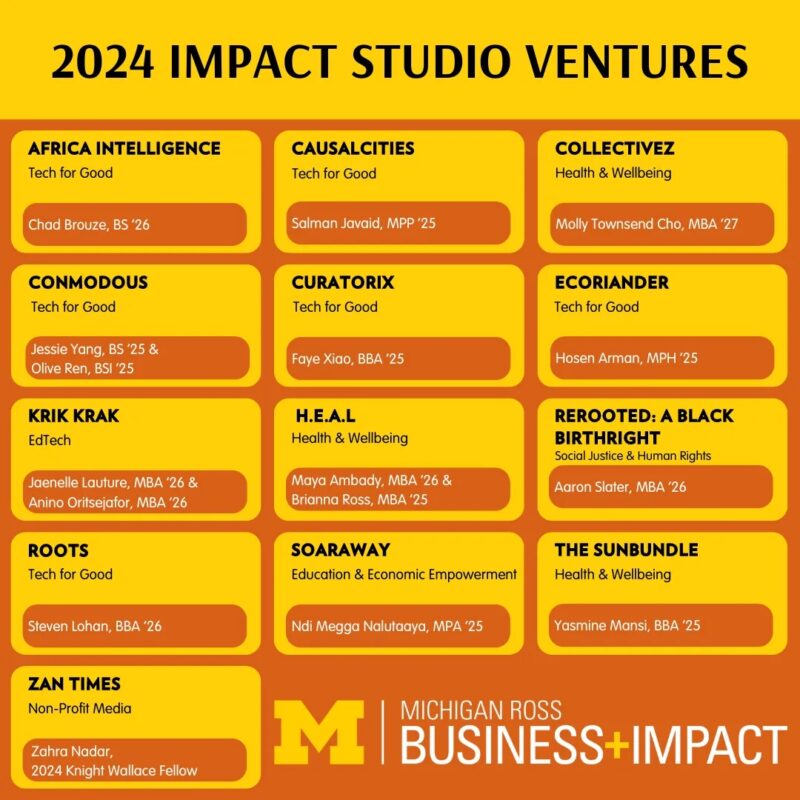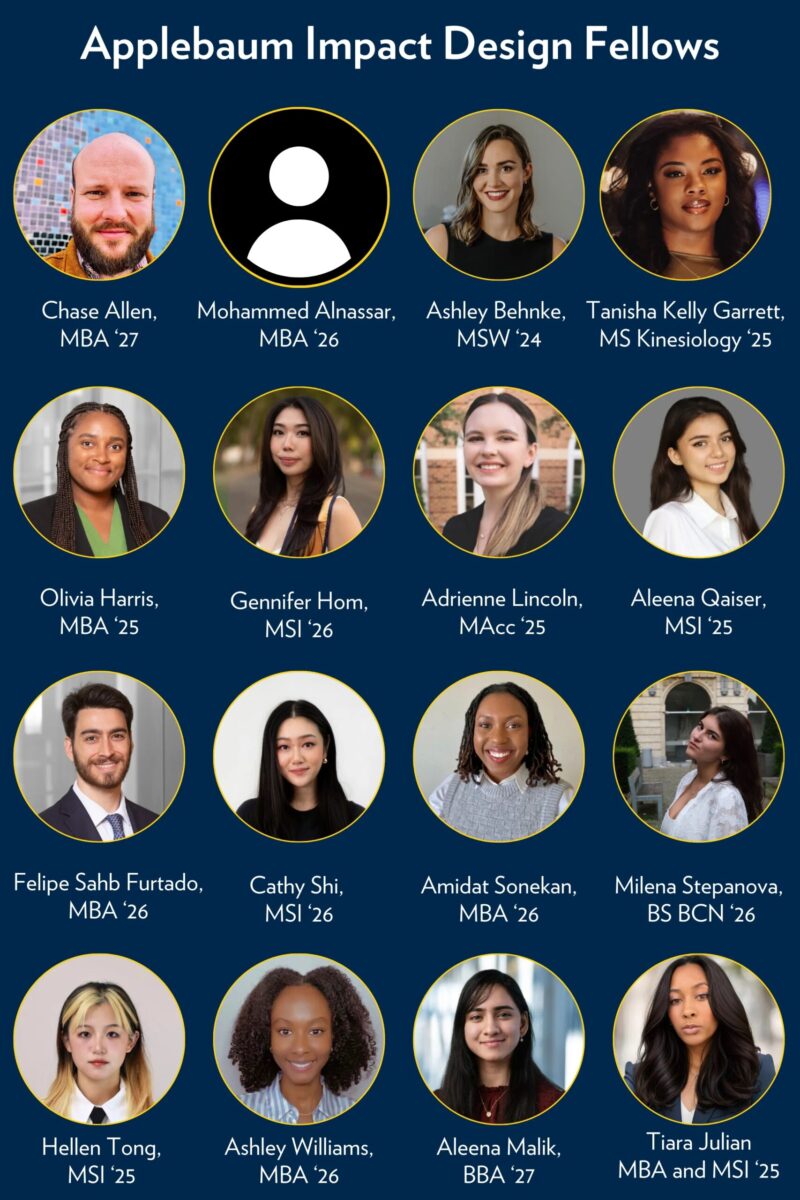Meet the Fall 2024 Impact Studio Cohort!
By Katie Moore (BA ’25) and Erica Yang

Fall 2024 Impact Studio Founders and Applebaum Impact Design Fellows
This academic year brings a new studio space, a new overhauled program, and a new group of Fellows and Founders to the Impact Studio — our largest cohort ever! From African languages AI to entry-level engineering aid, these ventures are more global and innovative than ever before. Let’s take a look at these ventures — and the minds behind them!
Impact Studio 2024 Founders

Zan Times is created by Zahra Nadar, a Knight-Wallace fellow and renowned Afghan journalist. The venture focuses on woman-led investigative journalism in Afghanistan. Through its reporting, Zan Times aims to raise awareness and effect change on issues surrounding human rights since the Taliban’s takeover of the country.
Steven Lohan is the founder of Roots, a venture aiming to preserve precious family memories rather than letting them slip away. By combining technology with nostalgia, Root hopes to centralize memories in a single secure platform, building a family history that’s easily accessible to future generations.
Aaron Slater leads Rerooted: A Black Birthright, a leadership program focused on creating a birthright program for Black youth and young adults that will allow them to reconnect with their roots and be empowered to change the trajectory of their lives and the lives of future generations to come. Slater hopes to invest in the next generation of African American youth through expanding their worldviews and providing them with necessary skills to succeed in years to come.
Collective Z is the product of Molly Townsend Cho, who’s currently pursuing her part-time MBA at Ross. This venture targets gig workers and independent contractors, the majority of whom do not have access to the same healthcare benefits as salaried workers. As the gig economy grows, CollectivEX aims to solve this problem by providing coverage for all workers, ensuring equity for those who don’t work full-time at a single organization.
SoarAway is the brainchild of Ndi Megga Nalutaaya, a Makerere University graduate and Afro-optimist currently pursuing her MPA. It is based in Uganda, the country with the world’s second youngest population and a great need for youth empowerment and mentorship. Through “Education Unusual” SoarAway intends to unleash a movement of creative, ethical and passion-driven young leaders rooted in their culture, equipped to drive positive transformation in their nation and beyond.
The SunBundle was founded by student-athlete Yasmine Mansi, who recognized an opportunity to upcycle surplus athletic gear within Michigan’s athletic department. Her inspiration came from witnessing the lack of proper footwear and equipment in underserved communities during her international track and field competitions in Egypt. This 501(c)(3) nonprofit aims to improve accessibility to fitness by streamlining the donation of unused athletic equipment from collegiate sports programs directly to those in need. Our care packages, or SunBundles, include hygiene essentials, educational materials on nutrition and exercise, and high-quality athletic gear. By promoting a culture of giving and environmental stewardship, The SunBundle empowers individuals and communities, fostering healthier lifestyles and greater participation in sports.
Javaid Salman heads up causalcities, a venture centered around creating an AI tool that will help track policy changes across counties, cities, and states in the U.S. With this tool, causalcities hopes to enable the public to keep an eye on issues, local and national, that they care about and thus aid others to help push for policy change they want to see in their governments.
Africa Intelligence was founded by Chad Brouze, a UM engineering student from South Africa focusing on bridging the historical technological divide between Africa and much of the Western world. Such a lag is currently reflected in AI, too; with limited linguistic data, fewer AI language models are being developed using African languages. Africa Intelligence intends to help solve this problem by bringing open-source AI to Africa at scale.
Jessie Yang and Olive Ren are developing Conmodous, a venture aimed at easing the learning curve for entry-level engineers, particularly those from underrepresented groups in the tech sector. Their mission is to make technical education more accessible and supportive, empowering individuals to envision a future in the tech industry and contribute to a diverse, capable workforce. Currently, they are investigating the Generative AI knowledge gap among users of non-profit coding platforms by engaging with organizations like Launch Code. Their hypothesis suggests that these online coding programs may not be introducing students to the most current AI development technologies, potentially leaving a critical gap in their education.
Hosen Arman, an MPH student from Bangladesh, is growing Ecoriander. During his time at Michigan, Arman discovered a passion for how our environment shapes public health, and decided to focus this passion on the Bangladeshi community in Detroits. Arman noticed that while many in the community eagerly engage in gardening, many are unaware of the risk of soil contamination. Ecoriander aims to resolve this issue through educational resources, bilingual guides, and soil testing kits, thus giving gardeners the necessary knowledge and tools to cultivate safer and healthier gardening practices.
Krik Krak is an innovative edtech venture co-founded by Jaenelle Lauture and Anino Oritsejafor, designed to bridge the gap for guardians who are physically distanced from their children — whether due to work, travel, military duty, or other commitments. As a digital learning platform, Krik Krak facilitates meaningful interactions through simultaneous reading sessions, and creates opportunities for educational engagement that strengthen connections, no matter the distance. With personalized learning paths and collaborative activities, the platform supports both learning and relationship-building across distances.
Cofounders Maya Ambady and Brianna Ross are back at the Impact Studio for a second year to continue building their venture, H.E.A.L (Helping Each other Advocate Loudly). H.E.A.L. is a platform-based app designed to empower Black, Indigenous Women of Color (BIWOC) in healthcare settings by facilitating patient-provider communication. They are exploring three concepts: appointment preparation and practice, learning modules and an online health community.
Curatorix is the product of Faye Xiao, another Founder returning to the Studio for a second year. The startup is a resource aggregator, where users curate collections of links, articles, videos, and diagrams, offering a quick starting point for others exploring new subjects or hobbies. The platform’s UI simplifies the process of sharing and creating tutorials, accommodating different learning styles through multiple formats. This makes high-quality, community-driven learning resources more accessible and easier to navigate, addressing the challenge of “not knowing what you don’t know”.
Impact Studio 2024 Applebaum Impact Design Fellows
These talented Fellows hail from 6 different schools across the U-M campus, and will be lending their expertise to help Founders build their ventures!

We are excited to see what this cohort of talented students will build in this upcoming school year!

